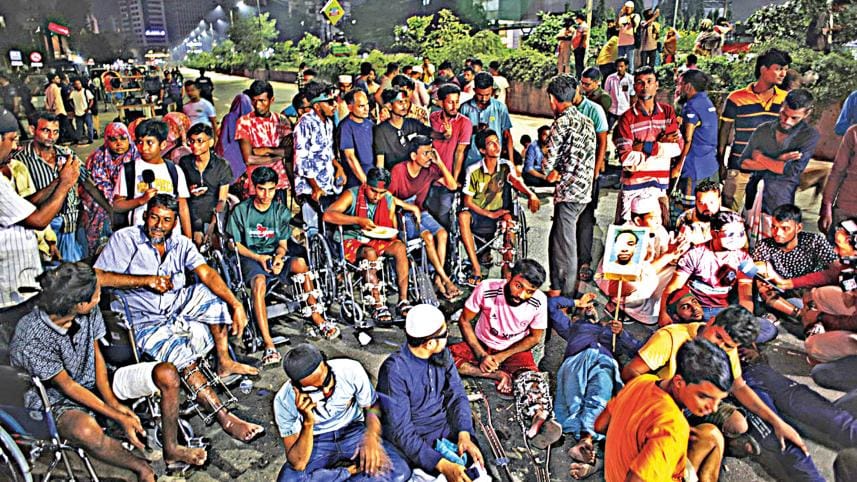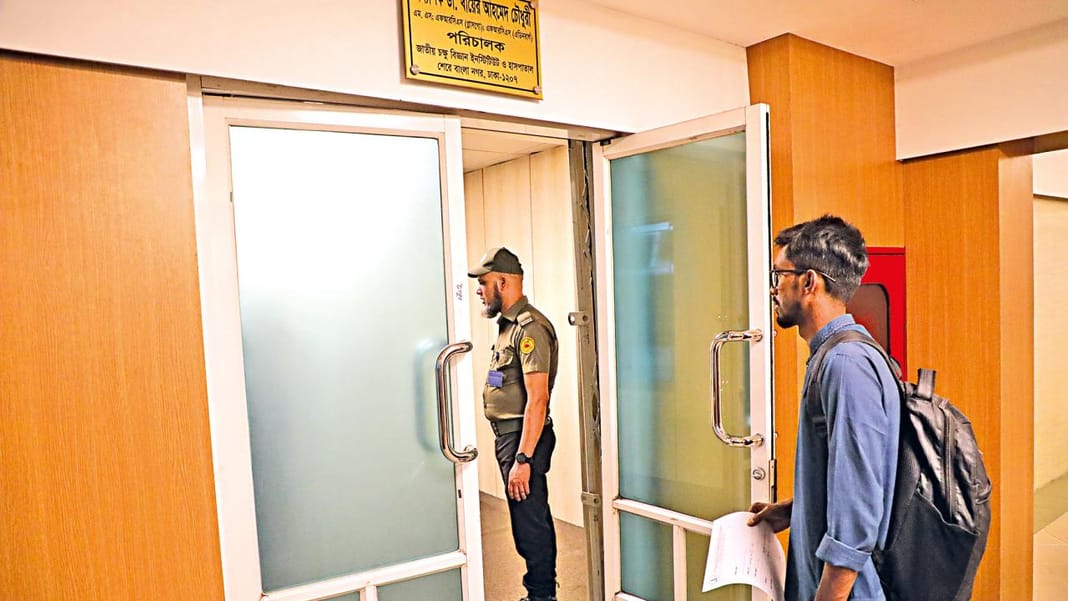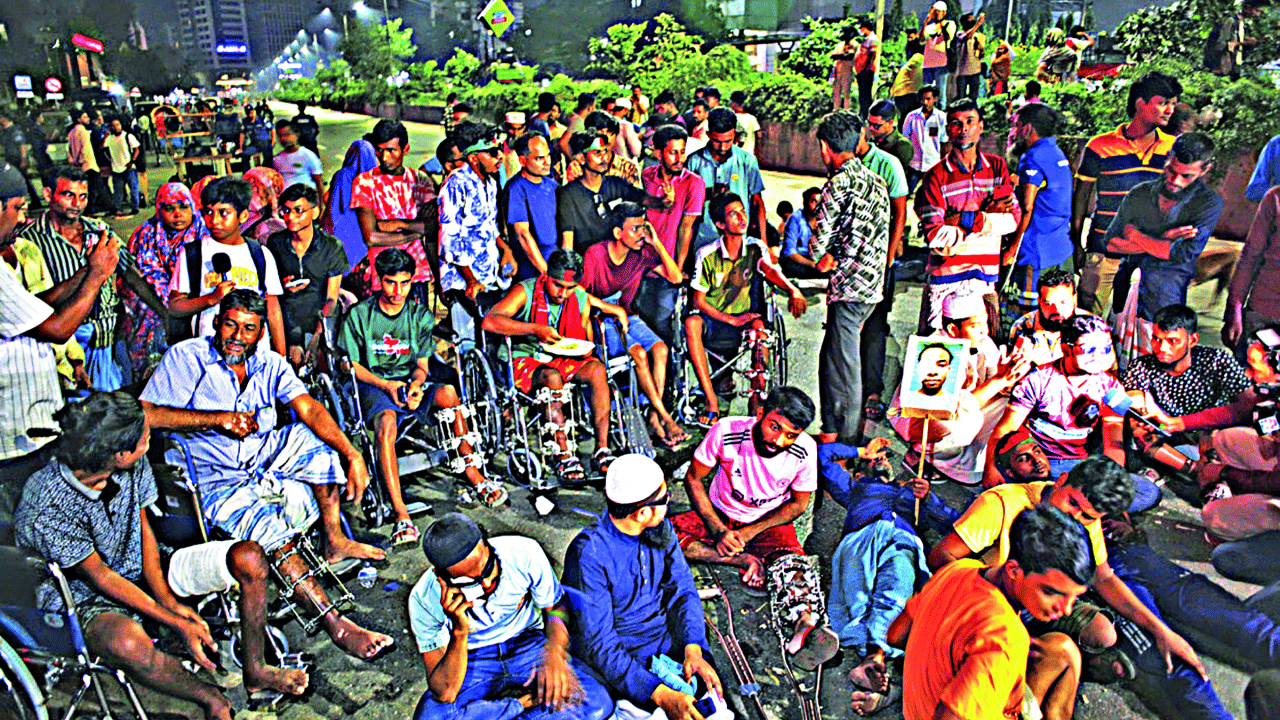Scars of July: How are the injured now?

The July Uprising ended with the fall of an autocratic government on August 5, but for thousands who survived the atrocity, the struggle did not end with their newfound freedom. They now remain crippled by lasting injuries, trapped in a daily fight against pain, disability, and financial insecurity. Despite promises of financial support and rehabilitation, many are still waiting for aid to arrive, while official commitments continue to lag far behind on-the-ground realities.
Injuries that changed everything
Arafat Hossain, once a driver, lost his leg to amputation—and with it, his livelihood. Categorised as a B-level injury victim, he received Tk 2 lakh from the government and an additional Tk 1 lakh from the July Foundation. But the financial aid has only partially mitigated his struggle.
"With the family's main source of income gone, my younger brother had to drop out of school. Another brother is educated but still struggling to find a job," he said. Although he cannot return to his previous job, he wanted to start a small poultry farm to support his family—a dream that remains distant without additional assistance. "If the monthly allowances arrived on time, I could at least start a small business," he mentioned.
Md Mijanur Rahman Badol is confronting the harsh reality of total visual impairment. "I can't see anything with my right eye, and my left eye has only 23% vision," he shared. "All the pellets are still lodged in my face, eyes, and head. They couldn't be removed. At times, they cause pain, and I often feel weak and disoriented. I'm still learning to live with this new reality."
He now relies on a small betel nut garden and a few livestock animals, which he managed to acquire with help from NGOs and other sources. The one-time government assistance was quickly consumed by the debts piled up in the months after his injury, leaving him no closer to financial stability. "I received the government-promised monthly allowance for only one month so far. The payments for the past two months are still pending. They informed me it would be disbursed together, so I'm waiting for that," he said, the frustration barely concealed in his tone.
Another victim, Akbar Ali, survives on borrowed money from his sisters and anyone willing to help. So far, he has only received support from the July Foundation. "I haven't received any government aid yet. There were some paper complications and delays in publishing the gazette list that contains my name," he said.

Similar bureaucratic complications were faced by another victim, Shahinur Miah. One of his eyes is gone forever, and the other now offers only a blur of light and shadow. Yet, he was incorrectly placed in Category B. When the writer first met him in April, Shahinur was at the National Institute of Ophthalmology & Hospital (NIOH), seeking approval from the director for a special letter recommending his reclassification to Category A.
He later submitted that letter to the local civil surgeon's office, which also issued a certificate acknowledging the misclassification and confirming that his case had been sent to the Ministry for correction. However, five months later, no change has been made.
"Since I'm listed as a B-category injured, I'm entitled to only Tk 3 lakh in one-time assistance from the government, of which I've received just Tk 1 lakh," he added. "I have to visit NIOH regularly for follow-up, which costs a lot for transportation, medicine, and accommodation."
Where do the authorities stand?
The Ministry of Liberation War Affairs acknowledges the ongoing issues. Md Faruk Hossain, Joint Secretary and In-Charge of the July Mass Uprising Cell at the Ministry, said at the end of September that monthly allowance disbursements had been completed for four divisions—Sylhet, Barishal, Mymensingh, and Rangpur—for those who submitted verified documentation.
"The rest of the divisions will be cleared within the first week of October," he added. One-time assistance—Tk 2 lakh for A-category, and Tk 1 lakh for B- and C-category fighters—has already been cleared, according to him. "The additional amount of Tk 3 lakh and Tk 2 lakh for A- and B-category injured, respectively, will be made once all information is updated," he added.
For many, even a modest monthly allowance could mean the difference between survival and further despair. Delays and fragmented support have left many victims to fend for themselves, often at the cost of dignity and hope.
When asked about the total number of disbursements, Md Faruk Hossain explained, "The monthly disbursement process is ongoing, and the exact number cannot be shared at this stage. Once we have updated information for all recipients, likely within the next five to six months, we will be able to provide an exact figure." He cited delays due to missing documents and incomplete bank details from many beneficiaries.
Apart from the Ministry, the July Shaheed Smrity Foundation is another key organisation assisting the injured with direct financial aid. "According to the latest update, more than 6,006 injured July fighters have so far received financial assistance from us," shared Md Zahid Hossain, Head of PR & Media at the Foundation.
Although the official number of the injured stands at 13,799, according to the Health Ministry's website, the shared figure indicates that a great number of survivors are still struggling for support and awaiting the assistance they are entitled to.

Urgent intervention required
Victims consistently call for urgent measures:
- Timely disbursement of entitled monthly stipends to ensure financial stability.
- Lifetime medical care through valid health cards.
- Streamlined procedures to reduce bureaucratic delays and minimise documentation-related hurdles.
For many, even a modest monthly allowance could mean the difference between survival and further despair. Delays and fragmented support have left many victims to fend for themselves, often at the cost of dignity and hope. Without prompt, comprehensive, and empathetic intervention, these survivors risk being left behind—reduced to mere shadows of the lives they once led.
Miftahul Jannat is a journalist at The Daily Star. She can be reached at miftahul@thedailystar.net
Send your articles for Slow Reads to slowreads@thedailystar.net. Check out our submission guidelines for details.




 For all latest news, follow The Daily Star's Google News channel.
For all latest news, follow The Daily Star's Google News channel.
Comments